The Steel Seraglio: a Review
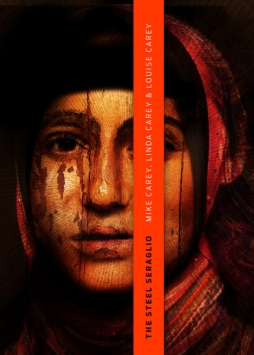 The Steel Seraglio
The Steel Seraglio
Mike, Linda, and Louise Carey
ChiZine Publications (424 pp, $15.95 US/$17.95 CAD, trade paperback)
Reviewed by Matthew Surridge
The Steel Seraglio is a fantasy novel by husband/wife/daughter trio Mike, Linda, and Louise Carey, put out by ChiZine Publications. There’s also a chapbook set in the same world (which you might be able to get if you order the book directly from ChiZine). It’s a story set in a pseudo-historical Arabia, in a desert of city-states ruled by sultans. When religious zealots stage a revolution in the city of Bessa, a chain of events is set in motion that results in the former Sultan’s former harem of 365 women banding together to take the city back, and installing their own enlightened rule. The book tells the story of the women, and the rise and fall of the city they make.
I thought it was a decent adventure novel with some nice touches; good enough, and the touches nice enough, that I wished it had been better — either a better adventure, or a better novel. I think the book narrowly fails to achieve all the grand effects that it aims for, mostly due to staging and logic that don’t feel entirely thought-through. And I think that what is most interesting about the book, specifically its narrative structure and use of narrative to establish character, is not particularly well-served by the epic adventure format. I also found I had some qualms about the setting, or at least how the setting was developed in the course of the story.
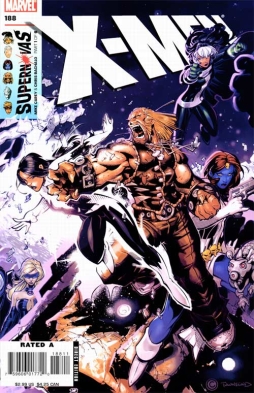 To give some background on the authors: Mike Carey’s a veteran comics writer. He’s written Lucifer and his creator-owned The Unwritten for DC Comics’ Vertigo imprint, as well as X-Men for Marvel, and a wide range of other titles. He’s also written a series of books about occult detective Felix Castor. Linda Carey’s a longtime teacher who (as A.J. Lake) published a fantasy trilogy for children, The Darkest Age. Louise Carey cowrote a comic called Confessions of a Blabbermouth with her father, and wrote The Diary of a London Schoolgirl for the web site of the London Metropolitan Archive.
To give some background on the authors: Mike Carey’s a veteran comics writer. He’s written Lucifer and his creator-owned The Unwritten for DC Comics’ Vertigo imprint, as well as X-Men for Marvel, and a wide range of other titles. He’s also written a series of books about occult detective Felix Castor. Linda Carey’s a longtime teacher who (as A.J. Lake) published a fantasy trilogy for children, The Darkest Age. Louise Carey cowrote a comic called Confessions of a Blabbermouth with her father, and wrote The Diary of a London Schoolgirl for the web site of the London Metropolitan Archive.
I mention these things by the way; of all of them, I’ve only ever read some of Carey’s comics work, including most of his run on X-Men. I thought he created some the more readable and entertaining X-Men comics of the past twenty years or so. I can’t imagine the difficulty involved in that sort of work, trying to deal with characters who have long and detailed histories, accomodating editorial mandates, dealing with curveballs like a writer in another title changing your lead heroine’s past to add a completely out of character one-night stand. Carey worked with these difficult narrative challenges, and pulled off some fine stories.
The parallel with Arabian Nights-style fiction is obvious: he’s used to telling stories that weave in and out of other stories. Also used to juggling a large cast. And used to heroic stories, to high adventure. All these things, to greater or lesser degrees, are present here.
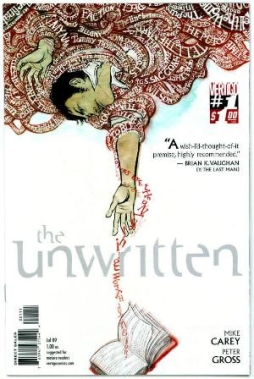 The Steel Seraglio does something I’m not sure I’ve ever seen: it’s influenced by The Arabian Nights rather than fully shaped by it. Most of the book is one text, and that text is occasionally, rarely, interrupted by other short stories which present alternate perspectives on the action of the overall story. Before the main text, for example, there are two introductory stories; the first is written is an elaborate, theatrical style — the style of a typical translation of The Arabian Nights — while the second is a deliberate contrast to the first, a kind of debunking of it, written in a more modern voice. That second piece explains who the narrator of the book is, and how she comes to know the various stories we get through the book: a character named Rem, who has the gift of almost-but-not-quite-absolute foreknowledge thanks to a djinn’s fulfillment of a misspoken wish.
The Steel Seraglio does something I’m not sure I’ve ever seen: it’s influenced by The Arabian Nights rather than fully shaped by it. Most of the book is one text, and that text is occasionally, rarely, interrupted by other short stories which present alternate perspectives on the action of the overall story. Before the main text, for example, there are two introductory stories; the first is written is an elaborate, theatrical style — the style of a typical translation of The Arabian Nights — while the second is a deliberate contrast to the first, a kind of debunking of it, written in a more modern voice. That second piece explains who the narrator of the book is, and how she comes to know the various stories we get through the book: a character named Rem, who has the gift of almost-but-not-quite-absolute foreknowledge thanks to a djinn’s fulfillment of a misspoken wish.
The short tales are fascinating, and often quite powerful. They’re frequently character pieces, giving the background of some of the book’s main players; there’s something fitting about a book that is in part about the telling of tales using stories to illuminate character. So to that extent the structure serves to illuminate the themes of the book, which is good. The problem is that while the main story doesn’t drag, neither is it consistently thrilling in terms of its use of language, not in the way the short pieces are. Since the book opens with two of the short pieces, I found it raised expectations it didn’t then fulfill.
Which is to say that the book seems mostly more interested in telling a story clearly than in pulling off intricate tricks of stories-within-stories-within-stories. It succeeds as far as it goes, but the story felt in the end too plain, too simple. It’s not entirely accurate to say that it was predictable, in that it made no real attempt at surprise. It lets you know what’s coming, and broadly how the story will unfold. The art then comes in the telling, and that, I think, is a large part of what left me, if not dissatisfied, at least feeling like the book could have been more than it was: there’s no sense of inevitability. The unfolding of the plot doesn’t illuminate the heavy foreshadowing, doesn’t feel like it’s connecting pieces. The story we get is less interesting than what we imagine based on the hints we’ve been given.
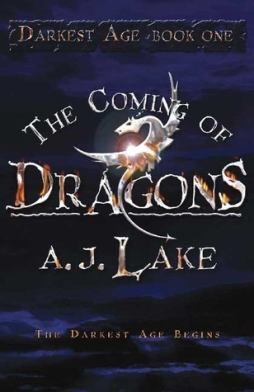 This is perhaps the delicate balance involved in foreshadowing. The right kind of hints can create a nebulous sense of what’s coming, a promise that the story can then fulfill. The wrong kind of hints actually promise too much, creating expectations no story can satisfy. I think in this particular case it doesn’t help that the construction of the story’s tragedy is more like Romeo and Juliet than it is like, say, Lear, or like Greek tragedy. In the latter cases, tragedy develops out of a flaw inherent in character: it’s inevitable. The same thing that makes a character great destroys the character. In Romeo and Juliet, tragedy comes because a message that would resolve the situation happily never gets delivered. The story could have been a comedy. But it wasn’t.
This is perhaps the delicate balance involved in foreshadowing. The right kind of hints can create a nebulous sense of what’s coming, a promise that the story can then fulfill. The wrong kind of hints actually promise too much, creating expectations no story can satisfy. I think in this particular case it doesn’t help that the construction of the story’s tragedy is more like Romeo and Juliet than it is like, say, Lear, or like Greek tragedy. In the latter cases, tragedy develops out of a flaw inherent in character: it’s inevitable. The same thing that makes a character great destroys the character. In Romeo and Juliet, tragedy comes because a message that would resolve the situation happily never gets delivered. The story could have been a comedy. But it wasn’t.
So things in The Steel Seraglio seem to just happen less because of the characters than because it’s the story being told (one argues that in this, too, it is like The Arabian Nights; but in any event the heavy foreshadowing sits ill beside this approach). The seraglio of the Sultan of Bessa is sent away when religious revolutionaries conquer the city; then the revolutionaries find out that the sultan’s son and heir is among the seraglio, and send orders to kill them all. Luckily, one of the seraglio members is a trained assassin, and the result is that the seraglio is able to kill their would-be killers and escape to a nearby desert oasis. They live there for a time, surviving by crafting trade goods they sell in a nearby city, then, after due training, they return and capture Bessa. For some time they live well, until ruin comes to their city.
Fair enough; but a lack of specificity makes much of this seem contrived. As I said, for almost a year the seraglio, plus children and various hangers-on, live in a hidden oasis among desert mountains, trading for food. But that’s a lot of food: something like a thousand meals a day, probably. That means quite a market for the various hand-made goods they create. And this is to say nothing of the practicalities of the situation, from how they dispose of their bodily wastes, to how they treat illnesses, to what would happen if one of the group decided they absolutely did not want to live in hiding. I’m not saying it’s impossible for this situation to work. But I think it needs some explanation, some detail, which the story glides over.
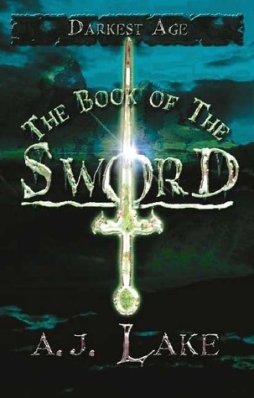 Conversely, when doom comes to the city, it comes as an unstoppable force. Characters who’ve been ingenious and consistently resourceful up to this point suddenly aren’t; because the story’s decided it’s time to end. It doesn’t help that the main villain of the piece has been consistently depicted as more bloodthirsty than intelligent. You can’t help but think: this is the threat that does them all in?
Conversely, when doom comes to the city, it comes as an unstoppable force. Characters who’ve been ingenious and consistently resourceful up to this point suddenly aren’t; because the story’s decided it’s time to end. It doesn’t help that the main villain of the piece has been consistently depicted as more bloodthirsty than intelligent. You can’t help but think: this is the threat that does them all in?
I don’t think these are critical problems. They could have been fixed fairly easily, usually with greater specificity — with a few details about how characters either think through and overcome problems (in the earlier part of the story) or hatch clever plans that don’t quite work (in the latter part). Collectively, I felt the lack of this detail made for a sense that the story was handwaving away difficulties. Rather than spend time coming up with satisfying reactions to the characters’ situations, the story moved where it wanted.
I think that tendency to the nonspecific is a particular problem in terms of the setting. That setting’s notionally this world, at some point in the past — in some of the short pieces, Rem predicts our future. Those pieces work in part because they’re precise; she locates her statements geographically and temporally (some of what she says would seem to suggest a time of roughly 400 CE). The main story, though, takes place in an Arabian Nights-style never-never-land: a country of djinns and sultans and assassins and seraglios. And a worship of a nonspecific God called the Increate (perhaps a reference to the use of the term in Gene Wolfe’s Book of the New Sun). And cities that never existed, like Bessa and Heqa’a and Perdondaris (definitely a reference to Lord Dunsany). I found it difficult to fit this setting into the supposed real-world past, but more than that, I found the whole thing annoyingly generic; while the story wanted to be about a revolution, about changes in political systems, about sex and gender and power relations, the setting wasn’t detailed enough to really allow those themes to come through as powerfully as they might have.
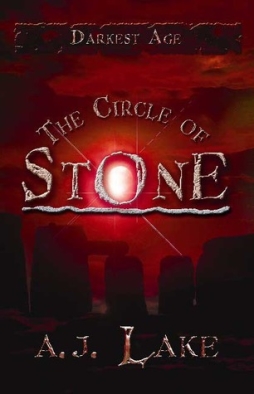 The book wants to show the seraglio transforming a patriarchal culture, but avoids giving details about that culture, presumably to preserve an ahistorical feel. That combination doesn’t seem to work. What is it that’s actually changing? I think broadly that the book would have been better if it had been more confrontational: more direct in its gender politics, and more direct in writing about sex — not necessarily more sex scenes, but more discussion of the things connected with sex: giving birth, aging and how that plays out in a seraglio, jealousy and how that plays out. All of these things are mentioned, but lack for detail; ideas are raised, but not explored. Possibly it would have been difficult to explore them and also keep the adventure story going, but as it is the book seems betwixt and between. Perhaps stronger character work would have allowed the brief mentions to resonate more strongly.
The book wants to show the seraglio transforming a patriarchal culture, but avoids giving details about that culture, presumably to preserve an ahistorical feel. That combination doesn’t seem to work. What is it that’s actually changing? I think broadly that the book would have been better if it had been more confrontational: more direct in its gender politics, and more direct in writing about sex — not necessarily more sex scenes, but more discussion of the things connected with sex: giving birth, aging and how that plays out in a seraglio, jealousy and how that plays out. All of these things are mentioned, but lack for detail; ideas are raised, but not explored. Possibly it would have been difficult to explore them and also keep the adventure story going, but as it is the book seems betwixt and between. Perhaps stronger character work would have allowed the brief mentions to resonate more strongly.
Certainly some might wonder at the use of a setting built out of such heavily-worn elements. It does risk falling into cliché. Of course many fantasy worlds are built out of traditions — whether traditions depicting medieval European situations, or Victorian steampunk fantasy, or highly-wrought worlds of the Far East — and of course the tradition of Arabic fantasy is an old one in English, going back at least to the first translations of The Arabian Nights in the eighteenth century (and continues as a healthy tradition in this day and age; consider Enily Mah’s series of posts on this website about Arabian fantasy, here and here and here and here and here). But it’s one thing to use trappings, it’s another to use them well; to build a scaffolding of credible detail to make the setting live.
Of course some will look askance at (presumably) Western writers struggling in the depiction of a foreign culture. I will say that I found myself wondering at some aspects of the book. Specifically, the depiction of the seraglio’s enlightened society seems to present them as almost the embodiment of certain contemporary Western dreams: they topple a religious dictatorship to install democratic rule. More, when they first find sanctuary in a desert oasis, they survive by industriously working at various crafts, and selling their products in a nearby market — like three hundred and sixty-five Robinson Crusoes, bringing a kind of capitalist Protestant work ethic to the practicalities of survival. Their city’s ultimately a success because they avoid the pointless petty wars that other city-states in the area engage in ceaselessly. So they are rational; they are industrious; they are democratic. Of course the ‘West’ has no monopoly on these traits, but put together like that, it sounds awfully familiar; as though it were an idealised picture of capitalist Western society.
 One can certainly read the book as an attempt to imagine these things developing naturally out of a Middle Eastern culture. What I think troubles me, and what I think weakens the story, is the way in which the new democratic culture so easily replaces the initial one. I’m not arguing values here; I’m saying that the establishment of a new way of doing things is, dramatically, more interesting when it’s met with resistance, and usually that resistance follows from the fact that there are reasons why things were the way they were. Or at least people think there are reasons, and so are invested in the established order.
One can certainly read the book as an attempt to imagine these things developing naturally out of a Middle Eastern culture. What I think troubles me, and what I think weakens the story, is the way in which the new democratic culture so easily replaces the initial one. I’m not arguing values here; I’m saying that the establishment of a new way of doing things is, dramatically, more interesting when it’s met with resistance, and usually that resistance follows from the fact that there are reasons why things were the way they were. Or at least people think there are reasons, and so are invested in the established order.
For example, even before the religious revolution in Bessa, we’re told that the leader of the seraglio, a wise woman named Gursoom, was able to steer the Sultan of the city away from meaningless wars that bedevilled the many other city-states. Then, of course, once the women take over, they’re able to avoid war more completely, turning various enemies against each other. One might wonder at the way the culture’s presented as pointlessly, inexplicably warlike; personally, I’m prepared to accept that this is the perspective the narrator, Rem, takes on things. But even if she sees no reason for the various minor wars of the region, presumably the people who fight in them ought to.
What does it mean that Bessa doesn’t fight wars while their neighbours do? Are they viewed as weak by the other cities? Is there a faction in the city that feels that they need a war to gain the respect of their neighbours, or that the city’s declining because of the extensive peace? Is there a surplus population of aggressive young men in Bessa, causing higher crime rates? It feels as though simply saying that Bessa didn’t do what the other cities did, and thrived because of it, weakens the setting; it’s hard to believe that all those other polities are all taking part in wars that don’t affect society as a whole.
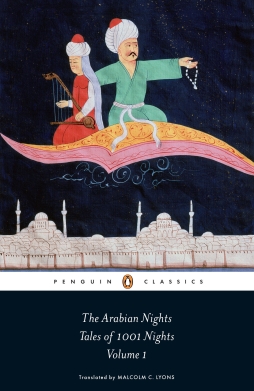 (I wondered if the story was going to reveal that Gursoom’s avoidance of war ironically led not only to the population spending more time debating philosophy and religion, but also to a high population of aggressive young men with no other outlet for violence, and so helped bring about the religious revival that triggered off the story of the seraglio in the first place. But I didn’t notice that implication in the text.)
(I wondered if the story was going to reveal that Gursoom’s avoidance of war ironically led not only to the population spending more time debating philosophy and religion, but also to a high population of aggressive young men with no other outlet for violence, and so helped bring about the religious revival that triggered off the story of the seraglio in the first place. But I didn’t notice that implication in the text.)
More: once the seraglio takes back Bessa from the religious extremists who held it, religion largely stops being a factor in the story. Once democracy takes root, the religious faction seems to disappear. That’s hard to believe. Again, it feels like a political dream: import democracy, watch religious fundamentalism vanish. In fact, there seems to be no real argument with the methods of democracy as envisioned by the leader of the Seraglio, to whom everyone seems naturally to defer. At a certain point, it all seems too easy.
I’d say also that the book doesn’t seem to know what to do with religion as an element of character. The main religion at play in the setting is not exactly Islam, but not exactly not Islam; the worship of the Increate is conveniently nonspecific. People — most people, not the zealots — don’t seem to make religious practice part of their lives. It doesn’t seem to shape their behaviour or dreams. Conversely, vastly powerful djinns exist, but don’t seem to be worshipped by anyone.
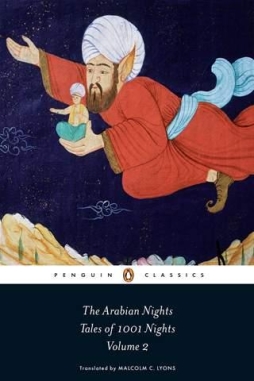 It’s the lack of specificity, I think, that I keep coming back to. Others may well not have the problems I did, or conversely might find them more significant than I did. Stylistically, the book is well-written, though only really remarkable in the shorter pieces. Mostly, it’s characterised by a sort of subtle thoughtfulness, a clever putting-together of incident and character. I will say that the characters were not equally well-developed; many of the minor figures remained merely names. But the overall development of the tale is sure, and even clever.
It’s the lack of specificity, I think, that I keep coming back to. Others may well not have the problems I did, or conversely might find them more significant than I did. Stylistically, the book is well-written, though only really remarkable in the shorter pieces. Mostly, it’s characterised by a sort of subtle thoughtfulness, a clever putting-together of incident and character. I will say that the characters were not equally well-developed; many of the minor figures remained merely names. But the overall development of the tale is sure, and even clever.
What I’m saying is that the telling of the story is effective. The narration is brisk, the marvels are marvellous, the heroines are heroic. There is much here that many readers will enjoy. But as I say, for me the effectiveness of the story makes me think that it could have delved more deeply; that it could have been better than it was. I thought the book was a decent adventure story. I also thought it could have been better.
Matthew David Surridge is the author of “The Word of Azrael,” from Black Gate 14. His ongoing web serial is The Fell Gard Codices. You can find him on facebook, or follow his Twitter account, Fell_Gard.
I remember hearing about this novel at the World Fantasy Convention last year. It sounded interesting then, and your write-up has not completely dimmed my interest. It sounds as though it has some real strengths.
As a big fan of The Arabian Nights, I’ll be especially curious to see a work that has been influenced by it, or that is cognizant of (and deliberately addresses) some of its rhetorical devices. I cannot help wondering if some of the foreshadowing issues you have come from a conscious effort on the part of the authors to echo the foreshadowing seen in various tales from the 1001 Nights.